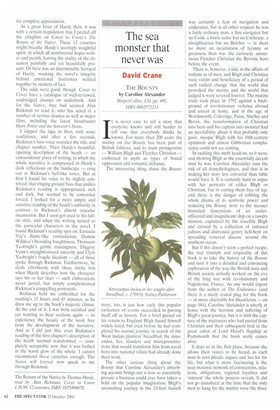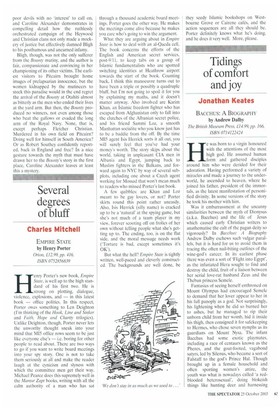The sea monster that never was
David Crane
THE BOUNTY by Caroline Alexander HarperCollins, 00 pp. 491, ISBN 0002572214 It is never easy to tell a story that everyone knows and still harder to tell one that everybody thinks he knows. For more than 200 years the mutiny on the Bounty has been part of British folklore, and its main protagonists — William Bligh and Fletcher Christian — enshrined in myth as types of brutal oppression and romantic defiance.
The interesting thing about the Bounty story, too, is just how early this popular caricature of events succeeded in passing itself off as history. For a brief period on his return to England Bligh found himself widely feted, but even before he had completed his second journey in search of the West Indian planters' breadfruit the innuendos, lies, slanders and misrepresentations that would transform him from naval hero into national villain had already done their work.
The other curious thing about the Bounty that Caroline Alexander's absorbing account brings out is how so essentially prosaic a business could ever have taken a hold on the popular imagination. Bligh's astonishing journey in the 23-foot launch
was certainly a feat of navigation and endurance, but in all other respects he was a fairly ordinary man, a fine navigator but no Cook, a brave sailor but no Cochrane, a disciplinarian but no Belcher — in short no more an incarnation of tyranny or greatness than was the curiously anonymous Fletcher Christian the Byronic hero before the event.
There is, however, a tide in the affairs of nations as of men, and Bligh and Christian were victim and beneficiary of a period of such radical change that the world that provoked the mutiny and the world that judged it were severed forever. The mutiny trials took place in 1792 against a background of revolutionary violence abroad and unrest at home, and in the age of Wordsworth, Coleridge, Paine, Shelley and Byron, the transformation of Christian into hero and his captain into monster had an inevitability about it that probably only poor, myopic Bligh with his 18th-century optimism and almost Gibbonian complacency could not see coming.
In tackling this myth head-on, as it were, and showing Bligh as the essentially decent man he was, Caroline Alexander runs the risk of all demythologisers, and that is in making her story less colourful than fable would have it. It is certainly hard to argue with her portraits of either Bligh or Christian, but in cutting them free of legend there is the danger of robbing the whole drama of its symbolic power and reducing the Bounty story to the meaner historical dimensions of an underofficered and insignificant ship on a tawdry mission, captained by the irascible Bligh and crewed by a collection of tattooed yahoos and distressed gentry hell-bent on spreading venereal disease around the southern ocean.
But if this doesn't seem a perfect recipe, the real triumph and originality of this book is to take the history of the Bounty and turn it into a detailed and convincing exploration of the way the British navy and British society actually worked on the eve of the long war with revolutionary and Napoleonic France. As one would expect from the author of The Endurance (and there is a nicely coded plug for the book — or more charitably for Shackle ton — on page 164), Caroline Alexander is utterly at home with the heroism and suffering of Bligh's great journey, but it is with the capture of the mutineers who had parted from Christian and their subsequent trial in the great cabin of Lord Hood's flagship at Portsmouth that the book really comes alive.
It does so in the first place, because she allows their voices to be heard, as each man in turn pleads, argues and lies for his life, but what is more fascinating is the near masonic network of connections, relations, obligations, regional loyalties and 'interest' the whole process reveals. It did not go unnoticed at the time that the only men to hang for the mutiny were the three poor devils with no Interest' to call on, and Caroline Alexander demonstrates in compelling detail how the ruthlessly orchestrated campaign of the Heywood and Christian clans not only made a mockery of justice but effectively damned Bligh to his posthumous and unearned infamy.
Bligh, though, was not the only sufferer from the Bounty mutiny, and the author is fair, compassionate and convincing in her championing of its other victims. The earliest visitors to Pitcairn brought home images of prelapsarian innocence, but the women kidnapped by the mutineers to stock this paradise would in the end regret the arrival of the Bounty at Otahiti almost as bitterly as the men who ended their lives at the yard arm. But then, the Bounty produced no winners, not even among those who beat the gallows or evaded the long arm of the Royal Navy. None, that is, except perhaps Fletcher Christian. Murdered in his own field on Pitcairn? Doing well for himself in South America? Or as Robert Southey confidently reported, back in England and free? In a nice gesture towards the myth that must have drawn her to the Bounty's story in the first place, Caroline Alexander leaves at least this a mystery.



































































































 Previous page
Previous page